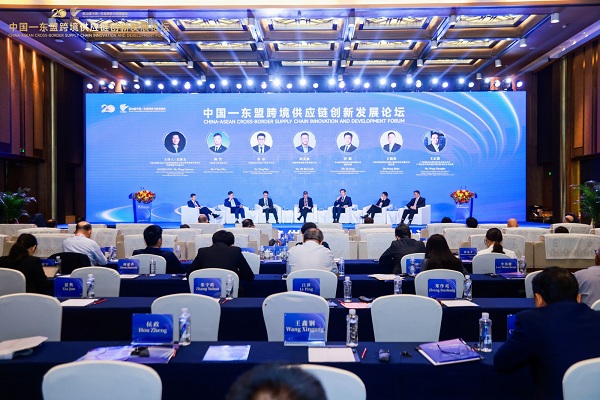Forum on China-ASEAN supply chain opens in Nanning

The China-ASEAN Cross-Border Supply Chain Innovation and Development Forum takes place in Nanning on Aug 10. [Photo provided to en.gxzf.gov.cn]
The China-ASEAN Cross-Border Supply Chain Innovation and Development Forum took place in Nanning, capital of Guangxi Zhuang autonomous region, on Aug 10.
Under the framework of the 20th China-ASEAN Business and Investment Summit, the forum was jointly hosted by the China Council for the Promotion of International Trade (CCPIT) and the People's Government of Guangxi Zhuang Autonomous Region.
It was attended by over 150 participants, including representatives from national chambers of commerce in ASEAN countries, experts, scholars, executives from Fortune Global 500 enterprises, and government officials from Beijing, Sichuan, Hainan, and Guangxi.
Guangxi officials noted that the region is willing to collaborate with ASEAN countries in aligning important initiatives and development strategies, generating new cooperative momentum in emerging sectors, and promoting economic recovery and sustainable development.
Great efforts will be devoted to key sectors, such as automotive, electronics, high-end metals, new materials, chemical engineering, and agricultural product processing.
Zhang Shaogang, vice chairman of CCPIT, highlighted the deepening economic and trade relations between China and ASEAN, and stated that ASEAN countries have become China's largest trading partners for the last three years.
Zhang also emphasized the urgent need to build a stable and efficient China-ASEAN industrial and supply chain system.
Malaysian Parliament Member Wee Ka Siong spoke highly of the successful collaboration between Malaysia and China in facilitating efficient customs clearance in the aviation sector.
This collaboration has reduced customs clearance time from the previous 24 to 48 hours to just 1.5 hours, leading to a significant increase in freight volume and the creation of 35,000 new job opportunities.
Over the next decade, this optimization is set to contribute 4.2 billion Malaysian Ringgit ($915.76 million) to Malaysia's GDP.














